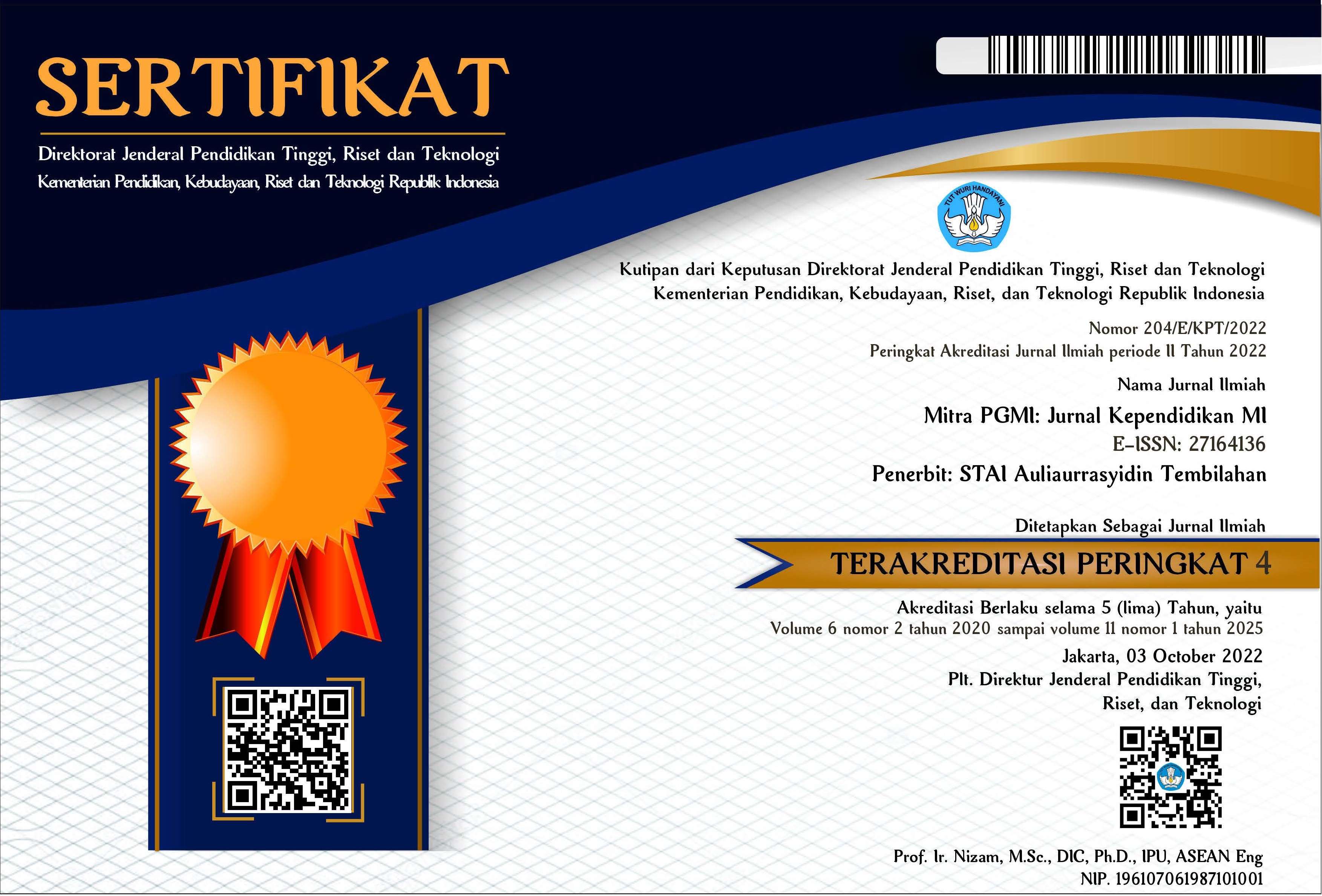Peran Edukasi Digital Islami dalam Menyikapi Kesehatan Mental (Stres) Mahasiswa Program Studi Pendidikan Guru Madrasah Ibtidaiyah (PGMI)
DOI:
https://doi.org/10.46963/mpgmi.v10i1.1668Keywords:
Islamic Digital Education, Mental Health, College StudentsAbstract
Student mental health is an important aspect that influences the quality of academic and personal life, although many studies discuss mental health, not many have contributed to the solution. The aim of this research is to determine the role of digital Islamic education in addressing mental health, especially stress, in students of the Madrasah Ibtidaiyah Education Study Program (PGMI) Muhammadiyah University of Riau. The research method uses a qualitative approach with information gathering techniques through in-depth interviews and observation. The information collected will be analyzed thematically. The results of this research provide an in-depth understanding of the ongoing impact of Islamic education on the mental health of PGMI students and provide a positive contribution to efforts to improve the mental well-being of PGMI students at Muhammadiyah University of Riau.
Downloads
References
Abdillah, M. T., Maulida, R., & Budiarti, E. (2022). Pencegahan Hoaks Pada Era Digital 4.0 dalam Perspektif Tafsir Kontemporer (Studi terhadap Tafsir al-Misbah dan Muyassar). In Hermeneutik (Vol. 16, Issue 1, p. 01). https://doi.org/10.21043/hermeneutik.v16i1.12973
Akbar, M. F., & Anggraeni, F. D. (2017). Teknologi Dalam Pendidikan: Literasi Digital dan Self-Directed Learning pada Mahasiswa Skripsi. Indigenous: Jurnal Ilmiah Psikologi, 2(1), 28–38. https://doi.org/10.23917/indigenous.v1i1.4458
Fajrussalam, H., Hasanah, I. A., Asri, N. O. A., & Anaureta, N. A. (2022). Peran Agama Islam dalam Pengaruh Kesehatan Mental Mahasiswa. Al-Fikri: Jurnal Studi Dan Penelitian Pendidikan Islam, 5(1), 22. https://doi.org/10.30659/jspi.v5i1.21041
Hajri, M. F. (2023). Pendidikan Islam di Era Digital: Tantangan dan Peluang pada Abad 21. Al-Mikraj, 4(1), 33–41. https://ejournal.insuriponorogo.ac.id/index.php/almikrajDOI:https://doi.org/10.37680/almikraj.v4i1.3006
Hasanah, U., & Sukri, M. (2023). Implementasi Literasi Digital Dalam Pendidikan Islam: Tantangan dan Solusi. Equilibrium: Jurnal Pendidikan, 11(2), 117–188. http://journal.unismuh.ac.id/index.php/equilibrium
Herling, C. S. (2009). Title. 369(1), 1689–1699. http://dx.doi.org/10.1016/j.jsames.2011.03.003%0A
Limone, P., & Toto, G. A. (2022). Factors That Predispose Undergraduates to Mental Issues: A Cumulative Literature Review for Future Research Perspectives. Frontiers in Public Health, 10(February). https://doi.org/10.3389/fpubh.2022.831349
Marlina, L. (2023). Legitimasi Al- Qur’ān tentang Konsep Kesehatan Mental. 8(2).
Mi, J. K., Negeri, I., & Pekanbaru, M. I. N. (2023). Mitra PGMI: 1–15.
Nur, H. A., Cahyanti, L., Yuliana, A. R., Fitriana, V., & Pramudaningsih, I. N. (2023). Kesehatan Mental Mahasiswa Dalam Proses Pembelajaran Daring Selama Pandemi Covid-19. Jurnal Keperawatan Dan Kesehatan Masyarakat Cendekia Utama, 12(1), 66. https://doi.org/10.31596/jcu.v12i1.1298
Nurhafiyah, I., & Marcos, H. (2023). Sistem Pakar Diagnosis Kesehatan Mental Pada Mahasiswa Universitas Amikom Purwokerto. Komputa: Jurnal Ilmiah Komputer Dan Informatika, 12(1), 49–56. https://doi.org/10.34010/komputa.v12i1.8978
Salji, I., Fauziah, I. D., Putri, N. S., & Zuhri, N. Z. (2022). Pengaruh Agama Islam Terhadap Kesehatan Mental Penganutnya. Islamika, 4(1), 47–57. https://doi.org/10.36088/islamika.v4i1.1598
Saputras, I. (2021). Penanaman Paham Literasi Digital Dalam Pembelajaran Pendidikan Agama Islam. Al-Tadzkiyyah: Jurnal Pendidikan Islam, 12(2), 360–365. http://ejournal.radenintan.ac.id/index.php/tadzkiyyah/article/view/11269
Setyanto, A. T. (2023). Deteksi Dini Prevalensi Gangguan Kesehatan Mental Mahasiswa di Perguruan Tinggi. Wacana, 15(1), 66. https://doi.org/10.20961/wacana.v15i1.69548
Syahputra, A., Sukmawati, E., Syafitri, R., Ar Ridho Jl Labuhan Tanggga Besar Kecamatan Bangko Kab Rokan hilir, S., Tafakkuh Fiddin Dumai, I., & Muhammadiyah Riau, U. (2023). Dampak Buruk Era Teknologi Informasi dan Komunikasi pada Remaja Usia Sekolah (dalam Perspektif Pendidikan Islam). Journal of Education Research, 4(3), 1265–1271. https://jer.or.id/index.php/jer/article/view/402
Undang-Undang Tentang Kesehat Jiwa. 2014. (2014). UU No. 18. Undang-Undang Republik Indonesia Tentang Kesehatan Mental No. 18 Tahun 2014. Applied Microbiology and Biotechnology, 85(1), 2071–2079.
Downloads
Published
Issue
Section
License
Copyright (c) 2024 Deprizon Deprizon, Refika Refika, Sahlan Sahlan, Ucy Rahmayani Nursyam, Afdhal Lestari, Astri Widyanthi

This work is licensed under a Creative Commons Attribution-ShareAlike 4.0 International License.
Authors who publish with this journal agree to the following terms:
1. Copyright on any article is retained by the author(s).
2. The author grants the journal, right of first publication with the work simultaneously licensed under a Creative Commons Attribution shareAlike 4.0 International License that allows others to share the work with an acknowledgment of the work’s authorship and initial publication in this journal.
3. Authors are able to enter into separate, additional contractual arrangements for the non-exclusive distribution of the journal’s published version of the work (e.g., post it to an institutional repository or publish it in a book), with an acknowledgment of its initial publication in this journal.
4. Authors are permitted and encouraged to post their work online (e.g., in institutional repositories or on their website) prior to and during the submission process, as it can lead to productive exchanges, as well as earlier and greater citation of published work.
5. The article and any associated published material is distributed under the Creative Commons Attribution-ShareAlike 4.0 International License








2.png)


